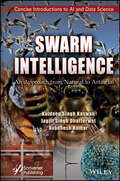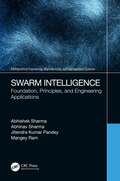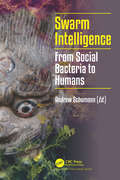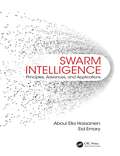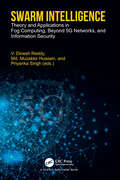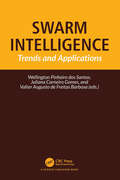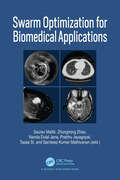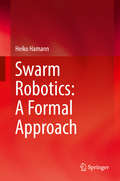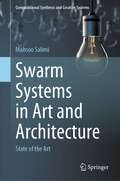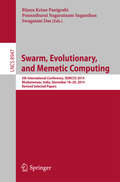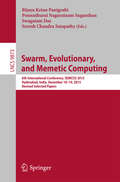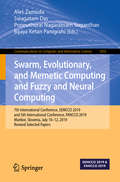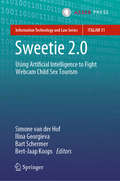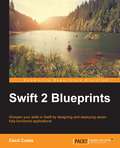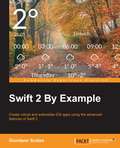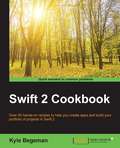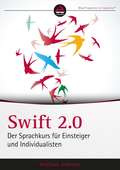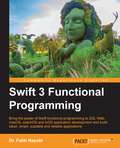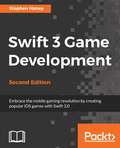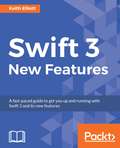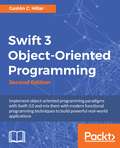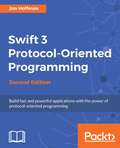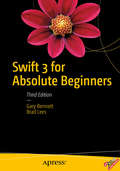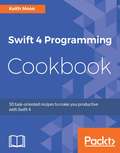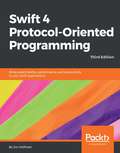- Table View
- List View
Swarm Intelligence: An Approach from Natural to Artificial (Concise Introductions to AI and Data Science)
by Avadhesh Kumar Jagjit Singh Dhatterwal Kuldeep Singh KaswanSWARM INTELLIGENCE This important authored book presents valuable new insights by exploring the boundaries shared by cognitive science, social psychology, artificial life, artificial intelligence, and evolutionary computation by applying these insights to solving complex engineering problems. Motivated by the capability of the biologically inspired algorithms, “Swarm Intelligence: An Approach from Natural to Artificial” focuses on ant, cat, crow, elephant, grasshopper, water wave and whale optimization, swarm cyborg and particle swarm optimization, and presents recent developments and applications concerning optimization with swarm intelligence techniques. The goal of the book is to offer a wide spectrum of sample works developed in leading research throughout the world about innovative methodologies of swarm intelligence and foundations of engineering swarm intelligent systems; as well as applications and interesting experiences using particle swarm optimization, which is at the heart of computational intelligence. Discussed in the book are applications of various swarm intelligence models to operational planning of energy plants, modeling, and control of robots, organic computing, techniques of cloud services, bioinspired optimization, routing protocols for next-generation networks inspired by collective behaviors of insect societies and cybernetic organisms. Audience The book is directed to researchers, practicing engineers, and students in computational intelligence who are interested in enhancing their knowledge of techniques and swarm intelligence.
Swarm Intelligence: Foundation, Principles, and Engineering Applications (ISSN)
by Mangey Ram Jitendra Kumar Pandey Abhishek Sharma Abhinav SharmaSwarm intelligence is one of the fastest growing subfields of artificial intelligence and soft computing. This field includes multiple optimization algorithms to solve NP-hard problems for which conventional methods are not effective. It inspires researchers in engineering sciences to learn theories from nature and incorporate them.Swarm Intelligence: Foundation, Principles, and Engineering Applications provides a comprehensive review of new swarm intelligence techniques and offers practical implementation of Particle Swarm Optimization (PSO) with MATLAB code. The book discusses the statistical analysis of swarm optimization techniques so that researchers can analyse their experiment design. It also includes algorithms in social sectors, oil and gas industries, and recent research findings of new optimization algorithms in the field of engineering describing the implementation in machine learning. This book is written for students of engineering, research scientists, and academicians involved in the engineering sciences.
Swarm Intelligence: From Social Bacteria to Humans
by Andrew SchumannThe notion of swarm intelligence was introduced for describing decentralized and self-organized behaviors of groups of animals. Then this idea was extrapolated to design groups of robots which interact locally to cumulate a collective reaction. Some natural examples of swarms are as follows: ant colonies, bee colonies, fish schooling, bird flocking, horse herding, bacterial colonies, multinucleated giant amoebae Physarum polycephalum, etc. In all these examples, individual agents behave locally with an emergence of their common effect. An intelligent behavior of swarm individuals is explained by the following biological reactions to attractants and repellents. Attractants are biologically active things, such as food pieces or sex pheromones, which attract individuals of swarm. Repellents are biologically active things, such as predators, which repel individuals of swarm. As a consequence, attractants and repellents stimulate the directed movement of swarms towards and away from the stimulus, respectively. It is worth noting that a group of people, such as pedestrians, follow some swarm patterns of flocking or schooling. For instance, humans prefer to avoid a person considered by them as a possible predator and if a substantial part of the group in the situation of escape panic (not less than 5%) changes the direction, then the rest follows the new direction, too. Some swarm patterns are observed among human beings under the conditions of their addictive behavior such as the behavior of alcoholics or gamers. The methodological framework of studying swarm intelligence is represented by unconventional computing, robotics, and cognitive science. In this book we aim to analyze new methodologies involved in studying swarm intelligence. We are going to bring together computer scientists and cognitive scientists dealing with swarm patterns from social bacteria to human beings. This book considers different models of simulating, controlling, and predicting the swarm behavior of different species from social bacteria to humans.
Swarm Intelligence: Principles, Advances, and Applications
by Aboul Ella Hassanien Eid EmarySwarm Intelligence: Principles, Advances, and Applications delivers in-depth coverage of bat, artificial fish swarm, firefly, cuckoo search, flower pollination, artificial bee colony, wolf search, and gray wolf optimization algorithms. The book begins with a brief introduction to mathematical optimization, addressing basic concepts related to swarm intelligence, such as randomness, random walks, and chaos theory. The text then: Describes the various swarm intelligence optimization methods, standardizing the variants, hybridizations, and algorithms whenever possible Discusses variants that focus more on binary, discrete, constrained, adaptive, and chaotic versions of the swarm optimizers Depicts real-world applications of the individual optimizers, emphasizing variable selection and fitness function design Details the similarities, differences, weaknesses, and strengths of each swarm optimization method Draws parallels between the operators and searching manners of the different algorithms Swarm Intelligence: Principles, Advances, and Applications presents a comprehensive treatment of modern swarm intelligence optimization methods, complete with illustrative examples and an extendable MATLAB® package for feature selection in wrapper mode applied on different data sets with benchmarking using different evaluation criteria. The book provides beginners with a solid foundation of swarm intelligence fundamentals, and offers experts valuable insight into new directions and hybridizations.
Swarm Intelligence: Theory and Applications in Fog Computing, Beyond 5G Networks, and Information Security
by Priyanka Singh V. Dinesh Reddy Md. Muzakkir HussainThis book offers a comprehensive overview of the theory and practical applications of swarm intelligence in fog computing, beyond 5G networks, and information security. The introduction section provides a background on swarm intelligence and its applications in real-world scenarios. The subsequent chapters focus on the practical applications of swarm intelligence in fog-edge computing, beyond 5G networks, and information security. The book explores various techniques such as computation offloading, task scheduling, resource allocation, spectrum management, radio resource management, wireless caching, joint resource optimization, energy management, path planning, UAV placement, and intelligent routing. Additionally, the book discusses the applications of swarm intelligence in optimizing parameters for information transmission, data encryption, and secure transmission in edge networks, multi-cloud systems, and 6G networks. The book is suitable for researchers, academics, and professionals interested in swarm intelligence and its applications in fog computing, beyond 5G networks, and information security. The book concludes by summarizing the key takeaways from each chapter and highlighting future research directions in these areas.
Swarm Intelligence: Trends and Applications
by Juliana Carneiro Gomes Wellington Pinheiro dos Santos Valter Augusto de Freitas BarbosaThis book presents the fundamentals of swarm intelligence, from classic algorithms to emerging techniques. It presents comprehensive theoretical foundations and examples using the main Computational Intelligence methods in programming languages such as Python, Java and MATLAB®. Real-world applications are also presented in areas as diverse as Medicine, Biology and industrial applications. The book is organized into two parts. The first part provides an introduction to swarming algorithms and hybrid techniques. In the second part, real world applications of swarm intelligence are presented to illustrate how swarm algorithms can be used in applications of optimization and pattern recognition, reviewing the principal methods and methodologies in swarm intelligence.
Swarm Optimization for Biomedical Applications
by Nanda Dulal Jana Zhongming Zhao Saurav Mallik Prabhu Jayagopal Tapas Si Sandeep Kumar MathivananBiomedical engineering is a rapidly growing interdisciplinary area that is providing solutions to biological and medical problems and improving the healthcare system. It is connected to various applications like protein structure prediction, computer-aided drug design, and computerized medical diagnosis based on image and signal data, which accomplish low-cost, accurate, and reliable solutions for improving healthcare services. With the recent advancements, machine learning (ML) and deep learning (DL) techniques are widely used in biomedical engineering to develop intelligent decision-making healthcare systems in real-time. However, accuracy and reliability in model performance can be a concern in tackling data generated from medical images and signals, making it challenging for researchers and practitioners. Therefore, optimized models can produce quality healthcare services to handle the complexities involved in biomedical research. Various optimization techniques have been employed to optimize parameters, hyper-parameters, and architectural information of ML/DL models explicitly applied to biological, medical, and signal data. The swarm intelligence approach has the potential to solve complex non-linear optimization problems. It mimics the collective behavior of social swarms such as ant colonies, honey bees, and bird flocks. The cooperative nature of swarms can search global settings of ML/DL models, which efficiently provide the solution to biomedical engineering applications. Finally, the book aims to provide the utility of swarm optimization and similar optimization techniques to design ML/DL models to improve the solutions related to biomedical engineering.
Swarm Robotics: A Formal Approach
by Heiko HamannThis book provides an introduction to Swarm Robotics, which is the application of methods from swarm intelligence to robotics. It goes on to present methods that allow readers to understand how to design large-scale robot systems by going through many example scenarios on topics such as aggregation, coordinated motion (flocking), task allocation, self-assembly, collective construction, and environmental monitoring. The author explains the methodology behind building multiple, simple robots and how the complexity emerges from the multiple interactions between these robots such that they are able to solve difficult tasks. The book can be used as a short textbook for specialized courses or as an introduction to Swarm Robotics for graduate students, researchers, and professionals who want a concise introduction to the field.
Swarm Systems in Art and Architecture: State of the Art (Computational Synthesis and Creative Systems)
by Mahsoo SalimiThis book presents the recent computational developments inspired by swarms in art known as swarm art and discusses applying swarm intelligence concepts in architecture. Non-human art is a great leap in the evolution of contemporary art, removing the requirement of an artist’s production from the creative process. Furthermore, it is a critical declaration in opposition to the anthropomorphic vision which is so destructive for all other life forms and the planet’s ecology. When accepted and integrated into human culture, non-human art done by artificial systems or machines boosts creativity and stimulates innovative fusions. We analyze 120 swarm systems with unique and diverse conceptual contexts, agent design, and audience engagement that can be utilized as inspiration for future projects or to design new swarm algorithms by artists, architects, or computer scientists.
Swarm, Evolutionary, and Memetic Computing
by Bijaya Ketan Panigrahi Swagatam Das Ponnuthurai Nagaratnam SuganthanThis volume constitutes the thoroughly refereed post-conference proceedings of the 5th International Conference on Swarm, Evolutionary, and Memetic Computing, SEMCCO 2014, held in Bhubaneswar, India, in December 2014. The total of 96 papers presented in this volume was carefully reviewed and selected from 250 submissions for inclusion in the proceedings. The papers cover a wide range of topics in swarm, evolutionary, memetic and other intelligent computing algorithms and their real world applications in problems selected from diverse domains of science and engineering.
Swarm, Evolutionary, and Memetic Computing
by Bijaya Ketan Panigrahi Swagatam Das Ponnuthurai Nagaratnam Suganthan Suresh Chandra SatapathyThis book constitutes the refereed proceedings of the Third International Conference on Swarm, Evolutionary, and Memetic Computing, SEMCCO 2012, held in Bhubaneswar, India, in December 2012. The 96 revised full papers presented were carefully reviewed and selected from 310 initial submissions. The papers cover a wide range of topics in swarm, evolutionary, memetic and other intelligent computing algorithms and their real world applications in problems selected from diverse domains of science and engineering.
Swarm, Evolutionary, and Memetic Computing and Fuzzy and Neural Computing: 7th International Conference, SEMCCO 2019, and 5th International Conference, FANCCO 2019, Maribor, Slovenia, July 10–12, 2019, Revised Selected Papers (Communications in Computer and Information Science #1092)
by Bijaya Ketan Panigrahi Swagatam Das Ponnuthurai Nagaratnam Suganthan Aleš ZamudaThis volume constitutes the thoroughly refereed post-conference proceedings of the 7th International Conference on Swarm, Evolutionary, and Memetic Computing, SEMCCO 2019, and 5th International Conference on Fuzzy and Neural Computing, FANCCO 2019, held in Maribor, Slovenia, in July 2019. The 18 full papers presented in this volume were carefully reviewed and selected from a total of 31 submissions for inclusion in the proceedings. The papers cover a wide range of topics in swarm, evolutionary, memetic and other intelligent computing algorithms and their real world applications in problems selected from diverse domains of science and engineering.
Sweetie 2.0: Using Artificial Intelligence to Fight Webcam Child Sex Tourism (Information Technology and Law Series #31)
by Simone van der Hof Bert-Jaap Koops Bart Schermer Ilina GeorgievaThis book centres on Webcam Child Sex Tourism and the Sweetie Project initiated by the children’s rights organization Terre des Hommes in 2013 in response to the exponential increase of online child abuse. Webcam child sex tourism is a growing international problem, which not only encourages the abuse and sexual exploitation of children and provides easy access to child-abuse images, but which is also a crime involving a relatively low risk for offenders as live-streamed webcam performances leave few traces that law enforcement can use. Moreover, webcam child sex tourism often has a cross-border character, which leads to jurisdictional conflicts and makes it even harder to obtain evidence, launch investigations or prosecute suspects.Terre des Hommes set out to actively tackle webcam child sex tourism by employing a virtual 10-year old Philippine girl named Sweetie, a so-called chatbot, to identify offenders in chatrooms. Sweetie 1.0 could be deployed only if police officers participated in chats, and thus was limited in dealing with the large number of offenders. With this in mind, a more pro-active and preventive approach was adopted to tackle the issue. Sweetie 2.0 was developed with an automated chat function to track, identify and deter individuals using the internet to sexually abuse children. Using chatbots allows the monitoring of larger parts of the internet to locate and identify (potential) offenders, and to send them messages to warn of the legal consequences should they proceed further.But using artificial intelligence raises serious legal questions. For instance, is sexually interacting with a virtual child actually a criminal offence? How do rules of criminal procedure apply to Sweetie as investigative software? Does using Sweetie 2.0 constitute entrapment? This book, the outcome of a comparative law research initiative by Leiden University’s Center for Law and Digital Technologies (eLaw) and the Tilburg Institute for Law, Technology, and Society (TILT), addresses the application of substantive criminal law and criminal procedure to Sweetie 2.0 within various jurisdictions around the world.This book is especially relevant for legislators and policy-makers, legal practitioners in criminal law, and all lawyers and academics interested in internet-related sexual offences and in Artificial Intelligence and law.Professor Simone van der Hof is General Director of Research at t he Center for Law and Digital Technologies (eLaw) of the Leiden Law School at Leiden University, The Netherlands. Ilina Georgieva, LL.M., is a PhD researcher at the Faculty of Governance and Global Affairs at Leiden University, Bart Schermer is an associate professor at the Center for Law and Digital Technologies (eLaw) of the Leiden Law School, and Professor Bert-Jaap Koops is Professor of Regulation and Technology at the Tilburg Institute for Law, Technology, and Society (TILT), Tilburg University, The Netherlands.
Swift 2 Blueprints
by Cecil CostaSharpen your skills in Swift by designing and deploying seven fully functional applicationsAbout This BookDevelop a variety of iOS-compatible applications that range from health and fitness to utilities using this project-based handbookDiscover ways to make the best use of the latest features in Swift to build on a wide array of applicationsFollow step-by-step instructions to create Swift apps oriented for the real worldWho This Book Is ForIf you are a competent iOS developer who wants to develop stunning applications with Swift, then this book is for you. Familiarity with Swift programming is assumed.What You Will LearnGet to grips with the basics of Xcode and Swift for application developmentCreate a Photo Sharing application to capture an image, edit it using different features and share it via social media.Develop applications using the WatchKit and exchange data between iPhone and the WatchUse advanced features such as SpriteKit to build a gameInstall third-party Swift frameworks to improvise on your application developmentDiscover how to simulate home automation with HomeKitBuild an application to monitor the user's weight, heart rate and the number of steps for Health Historic AnalysisManipulate media using AVFoundation framework to merge audio and video.In DetailIn this book, you will work through seven different projects to get you hands-on with developing amazing applications for iOS devices.We start off with a project that teaches you how to build a utility app using Swift. Moving on, we cover the concepts behind developing an entertainment or social networking related application, for example, a small application that helps you to share images, audio, and video files from one device to another. You'll also be guided through create a city information app with customized table views, a reminder app for the Apple Watch, and a game app using SpriteKit.By the end of this book, you will have the required skillset to develop various types of iOS applications with Swift that can run on different iOS devices. You will also be well versed with complex techniques that can be used to enhance the performance of your applications.Style and approachThis book takes a step-by-step approach to help you build apps from scratch and learn the methodology to develop real-time applications using Swift.
Swift 2 By Example
by Giordano ScalzoCreate robust and extensible iOS apps using the advanced features of Swift 2 About This Book * Get up to speed with the new features of Swift 2 by following the exhaustive examples in this book * Specialize in developing real iOS apps, and 2D and 3D videogames using Swift and Cocoapods * Learn how to build server API apps to feed your iOS client apps Who This Book Is For This book is ideal for those who want to learn to develop app in Swift, starting the right way. Whether you are an expert Objective-C programmer or are new to this platform, you'll quickly grasp the code of real world apps, and discover how to use Swift effectively. Prior experience in development for Apple devices would be helpful, but is not mandatory. What You Will Learn * Create a server in Swift to deliver JSON data to an iOS app * Take advantage of Cocoapods to use third-party libraries * Use a clean and effective architecture to decrease complexity and speed up development * Take advantage of the most useful parts of the iOS SDK * Build games with SpriteKit and SceneKit * Develop an app running on the cloud to act as an API server for your client's apps In Detail Swift is no longer the unripe language it was when launched by Apple at WWDC14, now it's a powerful and ready-for-production programming language that has empowered most new released apps. Swift is a user-friendly language with a smooth learning curve; it is safe, robust, and really flexible. Swift 2 is more powerful than ever; it introduces new ways to solve old problems, more robust error handling, and a new programming paradigm that favours composition over inheritance. Swift 2 by Example is a fast-paced, practical guide to help you learn how to develop iOS apps using Swift. Through the development of seven different iOS apps and one server app, you'll find out how to use either the right feature of the language or the right tool to solve a given problem. We begin by introducing you to the latest features of Swift 2, further kick-starting your app development journey by building a guessing game app, followed by a memory game. It doesn't end there, with a few more apps in store for you: a to-do list, a beautiful weather app, two games: Flappy Swift and Cube Runner, and finally an ecommerce app to top everything off. By the end of the book, you'll be able to build well-designed apps, effectively use AutoLayout, develop videogames, and build server apps. Style and approach These easy-to-follow tutorials show you how to build real-world apps. The difficulty and complexity level increases chapter by chapter. Each chapter is dedicated to build a new app, beginning from a basic and unstyled app through to a full 3D game. The last two chapters show you how to build a complete client-server ecommerce app right from scratch.
Swift 2 Cookbook
by Kyle BegemanOver 50 hands-on recipes to help you create apps and build your portfolio of projects in Swift 2 About This Book * Conceptualize and write effective applications for iOS/OS X using Swift 2 * Make the most of Swift's diverse features, from configuring your projects to using design patterns and different types of databases * A fast-paced, comprehensive guide equipped with lots of tips and tricks to help you learn about Swift programming quickly Who This Book Is For If you are an Apple developer who wants to use Swift to build your applications, this book is for you. With Swift 2 going open source, this book will also help web developers. Some understanding of Objective-C or Swift would be helpful but is not required. What You Will Learn * Install Xcode from the App Store * Upgrade your existing Swift 1.2 code to Swift 2.0 * Use the standard Swift 2.0 library and collections * Work with structs, generics, and design patterns in Swift * Use the new markup language to provide rich documentation of code * Write a book using Playgrounds and Swift * Debug and test your code using Xcode * Integrate your code with Objective-C and use assembly code with Swift * Leverage the Objective-C runtime when compiling Swift using associated objects In Detail Swift is Apple's innovative development language that was introduced at the WWDC (WorldWide Developers Conference) 2014 alongside Xcode 6 and iOS 8. This user-friendly language is packed with modern features to make programming easier and fun, with a lot of flexibility. With Swift 2 comes even better performance, a new error handling API, protocol extensions, and super support for availability checking. This book will equip you with all the practical programming aspects of Swift 2. It covers the important features and paradigms that Swift provides to developers. You will begin by installing Xcode from the App Store and using Swift as an interpreter. Then, you will see how you can upgrade your existing Swift 1.2 code to Swift 2.0 with the help of Xcode. You will see how to use structs and generics, and work with different Design Patterns with Swift. Debug and test your code using Xcode and see how to use assembly code effectively with Swift. By the end of this book, you will have the necessary skills to get the most out of Swift to develop effective mobile and web applications. Style and approach This book follows a problem-solution methodology using step-by-step recipes, and is filled with screenshots to help you create samples and learn something new in every recipe.
Swift 2.0: Der Sprachkurs für Einsteiger und Individualisten
by Wolfram SchroersSie möchten Apples neue Programmiersprache Swift erlernen, um Apps fürs iPhone oder iPad oder Programme für den Mac zu entwickeln? Dann finden Sie in diesem Buch alles, was Sie wissen müssen! Von den Entwicklungswerkzeugen und Ihrer ersten App über Schleifen und Verzweigungen bis zur objektorientierten Programmierung erklärt Ihnen Wolfram Schroers Schritt für Schritt alle benötigten Grundlagen. Natürlich erfahren Sie auch, wie Sie die Benutzeroberflächen Ihrer Anwendungen mit dem Cocoa-Framework gestalten und sie aufs iPhone, iPad oder den Mac portieren. Der besondere Clou sind dabei die Beispiele: Statt sich mit trockenen Programmieraufgaben zu langweilen, entwickeln Sie kleine Spiele oder einen Passwortgenerator. Alle Codebeispiele erhalten Sie zur besseren Orientierung natürlich auch zum Download auf der Verlagswebsite. Das Buch eignet sich sowohl für Programmieranfänger als auch für Umsteiger; falls Sie vorher schon in Objective-C programmiert haben sollten, werden Ihnen gezielte Hinweise über mögliche Fallstricke hinweghelfen. Starten Sie also durch mit Swift und schreiben Sie Ihre eigenen Apps und Mac-Programme!
Swift 3 Functional Programming
by Dr Fatih NayebiBring the power of Swift functional programming to iOS, Web, macOS, watchOS and tvOS application development and build clean, smart, scalable and reliable applications About This Book * Written for Swift 3 -Developers Preview version, this is a comprehensive guide that introduces iOS and OS X developers to the all-new world of functional programming that has so far been alien to them * Learn about first-class functions and how imperative-style patterns can be converted into functional code using some simple techniques * The book will get you familiar with using functional programming alongside existing OOP techniques so you can get the best of both worlds and develop clean, robust code Who This Book Is For The book is for developers with a basic knowledge of Swift programming aiming to incorporate functional programming paradigms in their day-to-day application development What You Will Learn * First-class, higher-order, and pure functions * Closures and capturing values * Custom operators, recursion, and memoization * Value and reference types in Swift * Enumerations, algebraic data types, patterns, and pattern matching * Generics and associated type protocols * Higher-order functions such as map, flatMap filter, and reduce * Dealing with optionals, fmap, and apply for multiple functional mapping * Functional data structures such as Semigroup, Monoid, Binary Search Tree, Linked List, Stack, and Lazy List * Immutability, copy constructors, and lenses * Combining FP paradigms with OOP, FRP, and POP in your day-to-day development activities * Developing a backend application with Swift * Developing an iOS application with FP, OOP, FRP, and POP paradigms In Detail This book is based on Swift 3 Developer preview version and aims at simplifying the functional programming (FP) paradigms making it easily usable, by showing you how to solve many of your day-to-day development problems. Whether you are new to functional programming and Swift or experienced, this book will strengthen the skills you need to design and develop high-quality, scalable, and efficient applications. The book starts with functional programming concepts, the basics of Swift 3, and essential concepts such as functions, closures, optionals, enumerations, immutability, and generics in detail with coding examples. Furthermore, this book introduces more advanced topics such as function composition, monads, functors, applicative functors, memoization, lenses, algebraic data types, functional data structures, functional reactive programming (FRP), protocol-oriented programming (POP) and mixing object-oriented programming (OOP) with functional programming (FP) paradigms. Finally, this book provides a working code example of a front-end application developed with these techniques and its corresponding back-end application developed with Swift. Style and approach This is an easy-to-follow guide full of hands-on coding examples of real-world applications. Each topic is explained sequentially and placed in context, and for the more inquisitive, there are more details of the concepts used. It introduces the Swift language basics and functional programming techniques in simple, non-mathematical vocabulary with examples in Swift.
Swift 3 Game Development - Second Edition
by Stephen HaneyEmbrace the mobile gaming revolution by creating popular iOS games with Swift 3.0 About This Book • Create and design games for iPhone and iPad using SpriteKit and Swift 3.0 • Learn the core fundamentals of SpriteKit game development and mix and match techniques to customize your game • This step-by-step practical guide will teach you to build games from scratch using little-known tips and strategies for maximum fun Who This Book Is For If you wish to create and publish fun iOS games using Swift, then this book is for you. You should be familiar with basic programming concepts. However, no prior game development or Apple ecosystem experience is required. What You Will Learn • Deliver powerful graphics, physics, and sound in your game by using SpriteKit • Set up the scene using the new capabilities of the scene editor and custom classes • Maximize gameplay with little-known tips and strategies for fun and repeatable action • Make use of animations, graphics, and particles to polish your game • Understand the current mobile monetization landscape to choose the best option for your own situation • Integrate your game with Game Center so that your players can share their high scores and achievements • Publish your game to the App Store and enjoy people playing your games In Detail Swift is the perfect choice for game development. Developers are intrigued by Swift 3.0 and want to make use of new features to develop their best games yet. Packed with best practices and easy-to-use examples, this book leads you step by step through the development of your first Swift game. This book starts by introducing SpriteKit and Swift's new features that can be used for game development. After setting up your first Swift project, you will build your first custom class, learn how to draw and animate your game, and add physics simulations. Then, you will add the player character, NPCs, and powerups. To make your game more fun and engaging, you will learn how to set up scenes and backgrounds, build fun menus, and integrate with Apple Game Center to add leaderboards and achievements. You will then make your game stand out by adding animations when game objects collide, and incorporate proven techniques such as the advanced particle system and graphics. Finally, you will explore the various options available to start down the path towards monetization and publish your finished games to the App Store. By the end of this book, you will be able to create your own iOS games using Swift and SpriteKit. Style and approach This project-based guide is engaging with a visually-rich approach rather than a text-heavy approach. With every chapter containing practical examples, you will understand how Swift programming works and make the most of the new features in version 3.0.
Swift 3 New Features
by Keith ElliottA fast-paced guide to get you up and running with Swift 3 and its new features About This Book * Get up to date with the latest changes to Swift 3 * Make your life easier by knowing how to port your Swift code to the latest version * Learn how to write programs that work on most of the major platforms such as iOS and Linux Who This Book Is For The book is for those who are familiar with Swift but are in need of clear guidance on what's changed in the latest version and the new features. What You Will Learn * Migrate a Swift 2.2 project to Swift 3 * Understand the workings of Swift Package Manager * Interact with Cocoa libraries when importing Objective C to Swift * Explore the function and operator changes new in Swift 3 * Work with the advanced type changes, attribute improvements, and floating point type improvements in Swift * Discover the changes in the Swift API and see how Objective-C can be manipulated in the current API * Implement the new features central to Swift Testing and understand the new debug features * Create server-side applications using Swift 3 In Detail Since Swift was introduced by Apple in WWDC 2015, it has gone on to become one of the most beloved languages to develop iOS applications with. In the new version, the Swift team aimed to take its adoption to the next level by making it available for new platforms and audiences. This book will very quickly get you up to speed and productive with Swift 3. You will begin by understanding the process of submitting new feature requests for future versions of Swift. Swift 3 allows you to develop and run your applications on a Linux machine. Using this feature, you will write your first Linux application using the debugger in Linux. Using Swift migrator, you will initiate a conversion from Swift 2.2 to Swift 3. Further on, you will learn how to interact with Cocoa libraries when importing Objective C to Swift. You will explore the function and operator changes new to Swift 3, followed by Collection and Closure changes. You will also see the changes in Swift 3 that allow you write tests easier with XCTest and debug your running code better with new formats as well. Finally, you will have a running server written completely in Swift on a Linux box. By the end of the book, you will know everything you need to know to dive into Swift 3 and build successful projects. Style and approach The book takes a tutorial-based approach offering an overview of the new features introduced in the latest version of Swift. It includes relevant examples of how code and concepts change when it comes to working on Swift 3 compared to previous versions.
Swift 3 Object Oriented Programming - Second Edition
by Gaston C. HillarThis book is for iOS and macOS developers who want to get a detailed practical understanding of object-oriented programming with the latest version of Swift: 3.0.
Swift 3 Protocol-Oriented Programming - Second Edition
by Jon HoffmanBuild fast and powerful applications with the power of protocol-oriented programming About This Book * Leverage the power of protocol-oriented programming in your applications and learn from real world use cases * Create a flexible codebase with protocols and protocol extensions * Increase the overall productivity and performance of applications with protocol-oriented programming Who This Book Is For This book is for Swift developers who want to learn and implement protocol-oriented programming in practical applications. What You Will Learn * Understand the difference between object-oriented programming and protocol-oriented programming * Explore the different types that Swift offers and what pitfalls to avoid * Error handling with do-try-catch block * Delve into Generics and Generic programming * Implement several design patterns in a protocol-oriented way * How to design applications by prioritizing the protocol first and the actual type second In Detail One of the most important additions to the new features and capabilities of the Swift programming language was an overhaul of Protocols. Protocol-oriented programming and first class value semantics have now become two incredibly powerful concepts at the heart of Swift's design. This book will help you understand the difference between object-oriented programming and protocol-oriented programming. It will demonstrate how to work with protocol-oriented programming using real world use cases. You will gain solid knowledge of the different types that can be used in Swift and the differences between value and reference types. You will be taught how to utilize the advanced features of protocol-oriented programming to boost the performance of your applications. By the end of the book, you will have a thorough understanding of protocol-oriented programming and how to utilize it to build powerful, practical applications. Style and approach This book is written for developers who learn best by working with code, so every concept discussed in this book is reinforced with real code examples.
Swift 3 for Absolute Beginners
by Gary Bennett Brad LeesStay motivated and overcome obstacles while learning to use Swift Playgrounds to be a great iOS developer. This book is perfect for those with no programming background, those with some programming experience but no object-oriented experience, or those that have a great idea for an app but haven't programmed since school, and it is now updated for Swift 3. Many people have a difficult time believing they can learn to write iOS apps. Swift 3 for Absolute Beginners, along with the free, live online training sessions will show you how to do so. You'll learn Object Oriented Programming and be introduced to HealthKit before moving on to write your own iPhone and Watch apps from scratch. Gary Bennett and Brad Lees are full-time professional iOS developers and have developed a broad spectrum of apps for Fortune 500 companies. The authors have taken their combined 12 years of writing apps, teaching online iOS courses, the experience from their first three iOS books, along with their online instruction and free online forum at XcelMe. com to create an excellent training book. What You'll Learn: #65533; Work with Swift classes, properties, and functions #65533; Examine proper user interface and user experience design #65533; Understand Swift data types: integers, floats, strings, and booleans #65533; Use Swift data collections: arrays and dictionaries #65533; Review Boolean logic, comparing data, and flow control Who This Book Is For Anyone who wants to learn to develop apps for the Mac, iPhone, and iPad, and Watch using the Swift programming language. No previous programming experience is necessary.
Swift 4 Programming Cookbook
by Keith MoonOver 50 recipes to help you quickly and efficiently build applications with Swift 4 and Xcode 9 About This Book • Write robust and efficient code and avoid common pitfalls using Swift 4 • Get a comprehensive coverage of the tools and techniques needed to create multi-platform apps with Swift 4 • Packed with easy-to-follow recipes, this book will help you develop code using the latest version of Swift Who This Book Is For If you are looking for a book to help you learn about the diverse features offered by Swift 4 along with tips and tricks to efficiently code and build applications, then this book is for you. Basic knowledge of Swift or general programming concepts will be beneficial. What You Will Learn • Explore basic to advanced concepts in Swift 4 Programming • Unleash advanced features of Apple's Xcode 9 IDE and Swift Playgrounds • Learn about the conditional statements, loops, and how to handle errors in Swift • Define flexible classes and structs using Generics, and learn about the advanced operators, and create custom operators • Explore functionalities outside of the standard libraries of Swift • Import your own custom functionality into Swift Playgrounds • Run Swift on Linux and investigate server-side programming with the server side framework Vapor In Detail Swift 4 is an exciting, multi-platform, general-purpose programming language. Being open source, modern and easy to use has made Swift one of the fastest growing programming languages. If you interested in exploring it, then this book is what you need. The book begins with an introduction to the basic building blocks of Swift 4, its syntax and the functionalities of Swift constructs. Then, introduces you to Apple's Xcode 9 IDE and Swift Playgrounds, which provide an ideal platform to write, execute, and debug the codes thus initiating your development process. Next, you'll learn to bundle variables into tuples, set order to your data with an array, store key-value pairs with dictionaries and you'll learn how to use the property observers. Later, explore the decision-making and control structures in Swift and learn how to handle errors in Swift 4. Then you'll, examine the advanced features of Swift, generics and operators, and then explore the functionalities outside of the standard library, provided by frameworks such as Foundation and UIKit. Also, you'll explore advanced features of Swift Playgrounds. At the end of the book, you'll learn server-side programming aspect of Swift 4 and see how to run Swift on Linux and then investigate Vapor, one of the most popular server-side frameworks for Swift. Style and approach Each recipe addresses a specific problem, with a detailed discussion that explains the solution and offers insight into how it works.
Swift 4 Protocol-Oriented Programming - Third Edition
by Jon HoffmanBuild fast and powerful applications by harnessing the power of protocol-oriented programming in Swift 4 About This Book • Leverage the power of protocol-oriented programming in your applications and learn from real-world use cases • Create a flexible code base with protocols and protocol extensions • Leverage the power of generics in Swift 4 to create very flexible frameworks Who This Book Is For This book is for Swift developers who want to learn and implement protocol-oriented programming in their real-world applications.. What You Will Learn • Understand the differences between object-oriented programming and protocol-oriented programming • Explore the different types that Swift offers and what pitfalls to avoid • Delve into generics and generic programming • Learn how to implement Copy-On-Write within your custom types • Implement several design patterns in a protocol-oriented way • Design applications by prioritizing the protocol first and the implementation types second In Detail Swift has become the number one language used in iOS and macOS development. The Swift standard library is developed using protocol-oriented programming techniques, generics, and first-class value semantics; therefore, every Swift developer should understand these powerful concepts and how to take advantage of them in their application design. This book will help you understand the differences between object-oriented programming and protocol-oriented programming. It will demonstrate how to work with protocol-oriented programming using real-world use cases. You will gain a solid knowledge of the various types that can be used in Swift and the differences between value and reference types. You will be taught how protocol-oriented programming techniques can be used to develop very flexible and easy-to-maintain code. By the end of the book, you will have a thorough understanding of protocol-oriented programming and how to utilize it to build powerful and practical applications. Style and approach This book is written for developers who learn best by working with code, so every concept discussed in this book is reinforced with real code examples.
